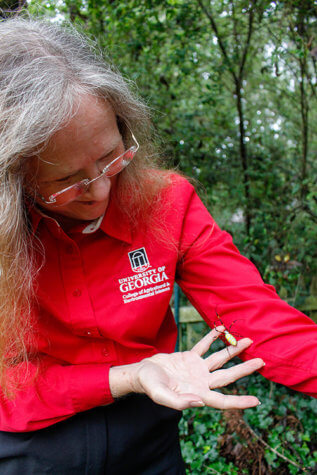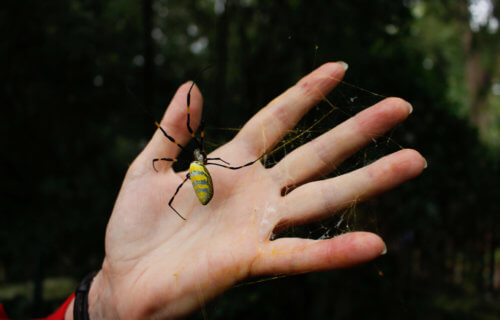
ATHENS, Ga. — Giant spiders are marching through the state of Georgia by the millions and wrapping dozens of counties in their golden webs. It sounds like a horror movie plot, but researchers from the University of Georgia say it’s really happening and it’s actually good for the local environment.
Joro spiders — which are about the size of a person’s palm — are brightly-colored, long-legged arachnids which come from East Asia originally. Since 2014, this invasive species has been spreading throughout Georgia. Now, researchers say they’re everywhere and they’re not going away.
“Last year, there were dozens of spiders, and they began to be something of a nuisance when I was doing yard work,” says UGA entomologist Will Hudson in a university release. “This year, I have several hundred, and they actually make the place look spooky with all the messy webs — like a scene out of ‘Arachnophobia.’”
Georgia residents have been sending hundreds of messages to UGA scientists, asking about these intimidatingly-large spiders which spin golden-colored webs on porches, power lines, and mailboxes. Overall, scientists have now found these visitors in 25 different counties throughout the state.
“Our best guess is that it came in a shipping container and dropped off here somewhere on I-85 in the Braselton area,” says Rick Hoebeke from the Georgia Museum of Natural History. “They are great little hitchhikers!”
The spider invasion is actually helping residents
Although local homeowners may freak out at the sight of hundreds of giant yellow spiders crawling up their front porch, researchers say this invasive species is here to help!

In fact, Hoebeke is hoping to convince Georgians that paying for exterminators to get rid of Joro spiders is a worse plan than learning to live with them. To this point, UGA researchers say they haven’t found any negative impacts of having the Joros spread through the state. Even their massive population won’t be an issue for long, as scientists say they’ll begin to die off in November as temperatures drop.
Moreover, UGA entomologist Nancy Hinkle says the Joro is a “beautiful creature that provides free pest control.”
“Joro spiders present us with excellent opportunities to suppress pests naturally, without chemicals, so I’m trying to convince people that having zillions of large spiders and their webs around is a good thing!” the researcher explains.
This particular species of spider helps eliminate local mosquitoes and other biting flies. The Joros are also one of the few spiders which catch and eat brown marmorated stink bugs — which are pests that can destroy many crops.
Don’t be scared, they don’t bite (really!)
While some spiders in nature pose a risk to humans due to their poisonous bites, the team says the Joro would rather just “hang” with you. In fact, Hinkle visited Hudson’s property just to take the “Joro tour” on his property and show people that these giant spiders don’t really have the ability or desire to bite humans.
“As with all orb weavers, it has small mouth parts… Right now she is just using me as substrate,” Hinkle explains.
Overall, scientists say the Joro is harmless to people and are large enough for people to see them and avoid them if they don’t like spiders.
As these bug hunters die off in November, the large yellow females will leave behind sacs full of eggs to keep the species going. These baby Joros will emerge in the spring and start hitchhiking again — possibly to a state near you!
https://youtu.be/6bFQdQcAZtk
